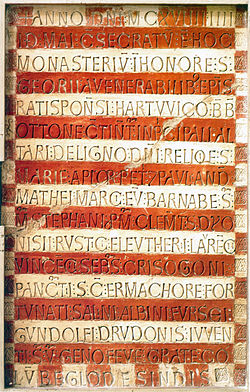Kutabaruku
Kutabaruku (kutoka mzizi wa Kiarabu unaokazia neno la kubariki) ni tendo la kuweka wakfu kwa Mungu altare, hekalu, kanisa au jengo lingine la kidini.[1]

Sikukuu ya kutabaruku
haririSikukuu ya kukumbuka tarehe ya kutabaruku hekalu au kanisa fulani inafanyika tangu zamani.
Katika Biblia
haririHanukkah, au "Sikukuu ya Wamakabayo", ni sikukuu ya Uyahudi inayodumu siku nane kuanzia tarehe 25 Kislev (mnamo Desemba, lakini pengine mwishoni mwa Novemba). Ilianzishwa na Yuda Mmakabayo na wenzake mwaka 165 KK kisha kutakasa Hekalu la Yerusalemu na hasa altare yake kutokana na unajisi uliosababishwa na mfalme Antioko Epifane (168 KK) alipodhulumu Uyahudi. [2] [3]
Yesu alishiriki sikukuu hiyo (Yoh 10:22) inayotajwa na Mtume Yohane kwa jina la τὰ ἐγκαίνια, ta engkainia, "the renewals").[4] Yosefu Flavio anaiita "mianga" tu.[5]
Katika Ukristo
haririKatika madhehebu mbalimbali, kama Kanisa Katoliki, Orthodoksi na Anglikana, makanisa yanawekwa wakfu na askofu kwa ibada inayoitwa kutabaruku.
Utaratibu mzima wa Kanisa la Kilatini unapatikana katika Caeremoniale Episcoporum, sura IX-X, na katika Missale Romanum.
Desturi hiyo ni ya kale, labda kama ujenzi wenyewe wa makanisa. Mwanzoni mwa karne ya 4 inashuhudiwa sehemu nyingi.[6]
Inawezekana sana kwamba desturi hiyo ilitokana na ile ya Agano la Kale. [7] [8]
Tazama pia
haririTanbihi
hariri- ↑ Definition of "dedicating" from Merriam-Webster's dictionary. Retrieved 15 November 2008.
- ↑ The significant happenings of the festival were the illumination of houses and synagogues, a custom probably taken over from the Feast of Tabernacles, and the recitation of Psalm 30:1-12:HE. The biblical references are 1 Maccabees 1:41-64, 4:36-39; 2 Maccabees 6:1-11; John:10:22. See also 2 Maccabees 1:9, 18; 2:16; and Josephus, Antiquities of the Jews XII. v. 4.
- ↑ J. Wellhausen suggests that the feast was originally connected with the winter solstice, and only afterwards with the events narrated in Maccabees.
- ↑ Andreas J. Köstenberger John 2004 "... incident occurred only about one month later (December 18–25).57 This is the first reference to the Feast of Dedication by this name (ta egkainia, ta enkainia [a typical “festive plural”]) in Jewish literature (Hengel 1999: 317). "
- ↑ Mercer Dictionary of the Bible ed. Watson E. Mills, Roger Aubrey Bullard, 1990. "Hence Hanukkah also is called the Feast of Lights, an alternate title Josephus confirms with this rationale: "And from that time to this we celebrate this festival, and call it 'Lights.' I suppose the reason was, because this liberty beyond our hopes appeared to us; and that thence was the name given to that festival."" (Per The works of Flavius Josephus translated by William Whiston.)
- ↑ Eusebius, Ecclesiastical History X. 3.
- ↑ The hallowing of the tabernacle and of its furniture and ornaments (Exodus 40); the dedication of Solomon's Temple (I Kings 8) and of the Second Temple by Zerubbabel (Ezra 6).
- ↑ Josephus, Antiqities of the Jews, XV. c. xi. 6.
Viungo vya nje
hariri- Urbs Beata Jerusalem dicta pacis visio - Catholic Encyclopedia article